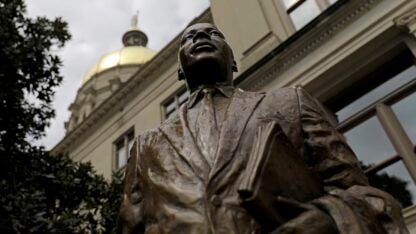Former residents of a Black neighborhood in north Georgia that was destroyed more than 50 years ago and replaced with university dorms and parking lots are demanding the university recognize their loss.
The city of Athens used eminent domain to force Black families out of the Linnentown neighborhood in the 1960s as part of an urban renewal plan. It sold the land to the state Board of Regents, and dorms and parking lots for the University of Georgia went up after the homes were razed.
Now, a group of former residents and descendants wants the university to apologize for the land seizure and create a memorial to Linnentown, which was home to dozens of Black families, the Atlanta Journal Constitution reported Friday. One member of the Linnentown Project group, Bobby Crook, told the newspaper the university needs to pay compensation, though he acknowledged that may not happen.
“It is heartbreaking because a whole community that nurtured, loved and supported you was erased,” said Hattie Thomas Whitehead, the president and community outreach coordinator for the Linnentown Project.
Whitehead’s father, Abe Thomas, built a home in Linnentown with help from the community. The family couldn’t afford to buy a new house after it was forced out of the neighborhood and moved into public housing in 1963.
UGA spokesman Greg Trevor told the AJC the university is interested in preserving Linnentown’s past and has offered to include the neighborhood in the Athens Oral History Archives, which are maintained by the University of Georgia Libraries. He said the university’s high-rise residence halls have housed tens of thousands of students from all races and socioeconomic backgrounds, providing them with the “transformational benefits of a higher education.”
“Diversity and inclusion are — and will always be — central to the University of Georgia academic community and a priority for the institution,” he said.
Linnentown is among numerous Black neighborhoods around the country that were destroyed to make way for what were deemed revitalization projects. The Linnentown purchase was supported by a federal grant.
The average condemnation award for homes in the neighborhood was $5,750, according to a resolution approved by Athens-Clarke County commissioners in February. The land — roughly 20 acres (8 hectares) — and the improvements on it are worth tens of millions of dollars today.
The county resolution did not mince words, accusing the city and the University System of Georgia of “an act of institutionalized white racism and terrorism resulting in intergenerational Black poverty, dissolution of family units, and trauma through the forcible removal and displacement of Black families, and the accumulation of the majority of their wealth and political power within the University System of Georgia and the City of Athens.”
Athens-Clarke Mayor Kelly Girtz apologized for Linnentown’s destruction.
Whitehead said she cried as she watched the apology, which caught her by surprise.
“I certainly do think this is a form of reparations,” she said.








